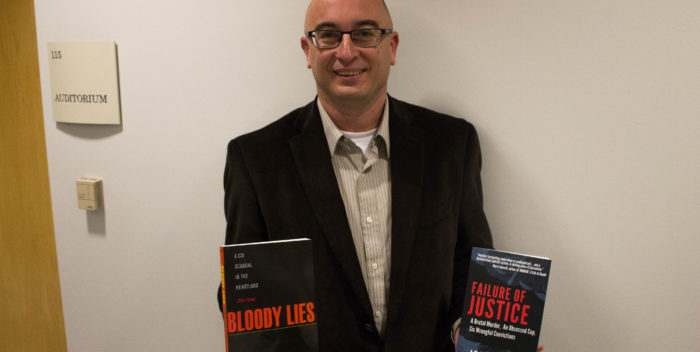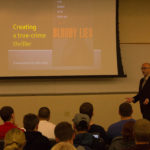Author John Ferak Speaks on Wrongful Convictions
by Benjamin Middendorf
Author and journalist John Ferak shared stories of rogue cops, misguided assumptions and justice served in a presentation on Tuesday, Sept. 13. The talk was a part of Concordia’s “Looking Beyond the Speaker” series and focused on two criminal cases that resulted in wrongful convictions which Ferak has written about in several true-crime novels.
“It has to be a good story for people to be interested,” Ferak said. “That draws people’s attention to these real miscarriages of justice.”
Ferak first became interested in criminal court cases while working as a reporter in Indiana. A larger reporting territory meant that many cases from rural areas came over his desk, and time spent in courthouses with judges, lawyers and police officers further piqued his interest.
The first case, chronicled in Ferak’s book “Failure of Justice: A Brutal Murder, An Obsessed Cop, Six Wrongful Convictions,” involved the murder and rape of an elderly widow in Beatrice, Nebraska, in 1985. Burdette “Burt” Searcey, a pig farmer fired from the Beatrice police department, became obsessed with the case, and four years later, after becoming a deputy for the Gage County Sheriff’s office, he headed an investigation. That investigation led to the arrest of six different people in 1989, five of whom confessed to being involved with the murder.
Only defendant Joseph White declared his innocence all the way to 2008, when new Nebraska legislation allowed DNA to be considered in prior cases. Later, DNA evidence showed that another man had perpetrated the crimes, and the six received full pardons after serving a combined 87 years in prison.
The second case, which Ferak relates in “Bloody Lies: Scandal in the Heartland,” occurred in Murdock, Nebraska, on Easter night, 2006. An older farming couple were shot point blank in their beds with shotguns. Initial suspicions from family pointed to the couple’s nephew and his cousin, and a blood spot found by Nebraska CSI expert David Kofoed and a confession from the nephew seemed to corroborate it.
Later clues in the case led investigators to a truck stolen from Wisconsin and the true culprits, which were a teenage couple on a rampage throughout the Midwest. The nephew and his cousin were released, and Kofoed was convicted of planting evidence.
Both of these cases involved confessions from people who were later proven innocent. Ferak noted that those arrested in the Beatrice Six case were threatened with the electric chair if they didn’t testify against the others, and many of the accused in both cases had mental health issues and IQs below 70.
Though shoddy police work led to wrongful convictions in the case of the Beatrice Six, Ferak noted that competent officers and lawyers are often needed to right these wrongs.
“It took a lot of guts for the Nebraska Attorney General’s office to step in,” Ferak said. “Because it was going to be super unpopular in Beatrice to come back and tell them, years after the fact, that ‘Oh by the way, you got it wrong; your sheriff’s office got it wrong.’”
Even when wrongful convictions are overturned due to clear evidence, Ferak said that communities have often made up their minds about who is guilty.
“There are still people in Murdock who think [the nephew] did it,” Ferak said. “The police department started a whisper campaign against him.”
- Photo by: Zane Francescato
- Photo by: Zane Francescato
- Photo by: Zane Francescato
- Photo by: Zane Francescato

















